News
3D printing bone tissue
Jun 28 2022
In recent years, scientists have witnessed the development of computing power that has enabled an unprecedented ability to model and predict the properties of materials. Machine learning has further enabled our ability to efficiently discover new materials and to optimise performance in systems containing them.

Advanced fabrication approaches such as 3D printing have given ACES the ability to create structures wherein materials are arranged in a way that optimises system performance – bringing out the best in all of the individual components.
New characterisation tools are giving insights into the performance of individual materials within these systems – without destruction of the device created – enabling unprecedented insights into performance over time.
Progress with living cell technologies are revolutionising how we think about treating human conditions.
The power and robustness of these scientific advances is unquestionable. If advances in each of these were converged, fundamental research could be taken into new technologies and enable us to explore things in a way we have never done before. At ACES, we are poised to have significant impact on the big challenges our planet faces in the areas of Energy and Health.
However, for now at least, this convergence is dependent on something less robust than the science itself. This convergence is critically dependent on the human chain that links research, translation and commercial development for social benefit.
That human scientific chain involves many individuals sharing knowledge with others that we trust and have confidence in. We all need to work together to ensure the human chain is strengthened and remains intact, if we are to deliver the outcomes our communities expect.
Personal attributes, such as reliability and integrity, underpin all of the critical relationships that hold the human chain together. At ACES, we have worked with great endeavour and enthusiasm to ensure we are at the forefront of emerging technologies. In parallel, we have worked to create the most efficient, reliable and robust human chain possible.
Within ACES we have identified challenges in diagnostics, robotics, energy and health. Challenges that can benefit from our ability to turn that knowledge into real applications.
We have assembled teams of individuals to maximise the opportunity for success.
We have introduced innovative training programs that go beyond the accrual of technical skills and impart other knowledge (in areas as ethics, regulation, commercialization and communication) that are equally important in ensuring translation.
We need to continue to consolidate, to build, and to strengthen that human scientific chain, a chain that is critical to success.
Recently, in an ACES workshop we joined with clinicians and surgeons from across the country to review fundamental advances in biofabrication, stem cell technologies and biomaterials science. We discussed how these advances could be used to further develop new technologies to tackle significant medical challenges that included cartilage regeneration, 3D printing of ears to treat microtia, improvements in islet cell transplantation to treat diabetes and new approaches for wound healing, focusing on burns.
The take home message from that event is applicable to all of our endeavours.
The workshop started with a plea from Prof Fiona Wood – a globally recognised burns specialist from Western Australia – a plea on behalf of her patients – “We have to do better”.
As the group considered the resources and talents available in Australia, we added “We can do better”.
Upon further reflection on the sheer determination and resilience of researchers, we concluded “We will do better!”
So let me leave you with this thought. The communities we work for are facing many critical challenges in Energy and Health – we can provide solutions to these challenges.
We have to do better – We can do better – We will do better!
I am confident the ACES team will continue to deliver great outcomes in 2020. I look forward to working with all my colleagues and our collaborators from across Australia and around the world to do so.
Post Script: I wrote the above a few weeks ago as part of our annual report to the Australian Research Council. Recent events have underscored the need for a robust human “supply” chain. That chain is emerging in our fight against COVID-19. Through one of our areas of endeavor, 3D printing, we are working with others around the globe, around our country and locally to deliver solutions to the immediate challenges facing front line health workers. This includes a local effort in Wollongong to produce protective face shields as well as exploring our ability to contribute to the production of ventilator components.
ACES will be hosting a webinar on Building Collaborative Research Teams on April 8. Sign up here. Also check out our website for other ACES activities you can engage in from home.
This article was originally posted on LinkedIn by Prof Gordon Wallace













